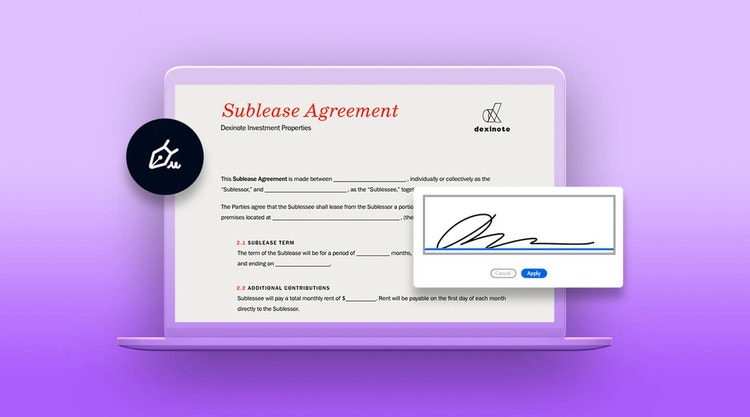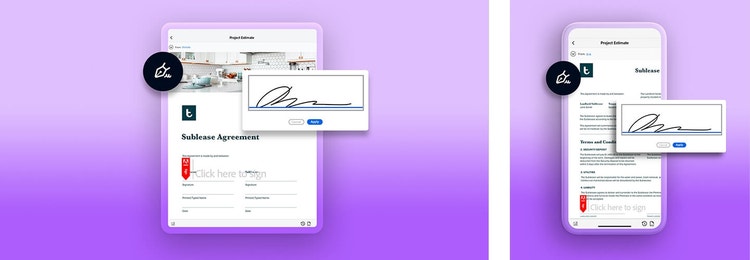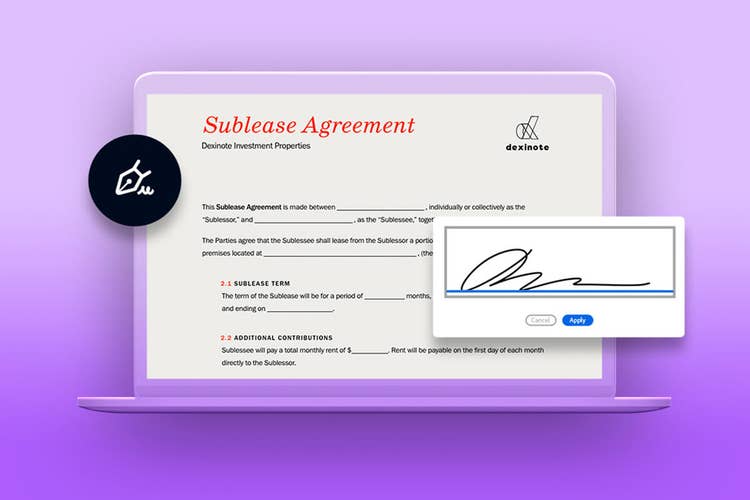Adobe Acrobat
How to write a simple sublease rental agreement.
You’ll need a sublease contract if you want to rent out your space to another tenant for a short term. Learn how to make a complete and clear sublease agreement.

What is a sublease agreement?
Subleasing (or subletting) is when a rental property or portion of a rental property is rented to another tenant for a short-term stay. If you want to sublease your room or rental unit, you need a sublease contract, which is a written agreement that acts as a lease within a lease. It allows the original tenant (sublessor) to rent out their room, apartment, house, or other rental property to a subtenant (sublessee) for a limited time period.
Situations that call for a sublease.
Because commercial leases are often long and come with large termination fees, subleasing is a great option for commercial renters who aren’t using all of their space. Both the sublessor and sublessee should understand the details in the original lease agreement and feel confident in the other party’s ability to pay their share of the rent.
Residential sublets make sense for renters who are gone for a month or more. Whether you’re flying home for the holidays or taking an extended business trip, you likely don’t want to be stuck making rent payments for a place you’re not living in.
Even if you’re renting to someone you know, you should still draw up a formal agreement. A sublease is a binding legal document that helps keep both parties accountable. In the worst-case scenario, it can help you navigate legal processes and free you from liability.
Who's responsible for the lease?
The original tenant is still responsible for paying the rent and for any damages to the property. There’s certainly a level of risk you take on when you sublet, which makes a solid sublease agreement all the more important to help guard against liabilities down the road.

What to include in your sublease agreement.
Here’s a list of common sections to include in your sublease contract. To make sure your agreement is legal, valid, and thorough, you might want to get legal advice on the language you use and, if possible, get your sublease contract looked over by a lawyer.
- Contact information. Both parties should fill out identification information like their name, phone number, and email address, as well as the full address of the rental.
- Original lease agreement details. Provide a copy of the original or master lease so both parties can reference it.
- Monthly rent. State the amount of rent owed per month or week, as well as how the renter should pay rent.
- Lease term. Include the move-in and move-out dates for the sublease term. Some subleases include the option to renew the lease at the end of the term. Make note of this in the contract if this is the case.
- Security deposit amount. You may require the sublessee to pay a security deposit as insurance against any property damage caused during their stay. Explain how it will be refunded on their departure, assuming the property is in good shape at the lease end date, outside of reasonable wear and tear.
- Late fees. In the event that rent is paid late, state what fees will be charged and what the grounds for eviction would be regarding missed payments.
- Policies. List any rules you or the property owner will enforce for smoking, pets, parking, or having guests over. In this section you can also identify which areas of the property the subtenant has access to, and which areas of the property are off-limits.
- Landlord's consent. Your landlord needs to sign off on your sublease agreement.
- Utilities. State which utility costs the sublessee will be responsible for.
- Furnishings. List any furnishings included in the room or property being sublet.
- Paint disclosure. If your rental unit was built before 1978, U.S. federal law mandates that you must disclose any known information about lead-based paint being used in the property. There may be other disclosures required by your local governing laws. Reference your master lease to double-check, or do some background research of your own. the work to be completed

Make light work of subleasing with Adobe Acrobat Pro.
Between the rental application and sublet agreement, signing a sublease can add up to a lot of papers flying around from landlord to tenant to subtenant. Keep the whirlwind to a minimum by switching to e-documents with Acrobat Pro.
You can easily make your own sublease agreement template, and then send it out for signature in a few clicks. You can also create templates for other contracts and forms. Sign on any device, keep track of your document’s progress, and collaborate, comment on, and edit your contract so everyone’s on the same page. Get all you need to give yourself and your sublessee a successful tenancy today.
